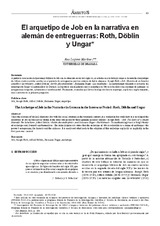El arquetipo de Job en la narrativa en alemán de entreguerras: Roth, Döblin y Ungar
The Archetype of Job in the Narrative in German in the Inter-war Period: Roth, Döblin and Ungar
Autor
Laguna Martínez, Ana
Editor
Asociación de Estudios de Ciencias Sociales y HumanidadesFecha
2019Materia
JobRoth, Joseph, 1894-1939
Döblin, Alfred, 1878-1957
Ungar, Hermann, 1893-1929
Arquetipo
Archetype
METS:
Mostrar el registro METSPREMIS:
Mostrar el registro PREMISMetadatos
Mostrar el registro completo del ítemResumen
A partir de la relación del personaje bíblico de Job con la situación social del siglo XX, se estudia en este trabajo cómo se desarrolla el arquetipo de Job en cuatro novelas escritas en el período de entreguerras por tres autores de habla alemana: Joseph Roth –Job. Historia de un hombre sencillo y La rebelión–, Alfred Döblin –Berlin Alexanderplatz–, Hermann Ungar –Los mutilados–. La metodología utilizada es la teoría del arquetipo de Jung y el mitoanálisis de Durand. La hipótesis inicial plantea que el arquetipo de Job es reductible a un esquema de mitemas: el antagonismo del poder, la honradez y la enfermedad. Finalmente, se analiza qué lleva a la adopción de este arquetipo, explícita o implícitamente, en el contexto de la primera posguerra. Since the relation of biblical character Job with the social situation in the twentieth century, it is studied in this work how it is developed the archetype of Job in four novels writen in the inter-war period by three german-speakers authors: Joseph Roth- –Job. The Story of a Simple Man and The Rebellion–, Alfred Döblin –Berlin Alexanderplatz–, and Hermann Ungar –The Maimed–. The methodology used is Jung’s theory of archetype and Durand’s mythoanalysse. The initial hypotessys states that the archetype of Job is reductible to a skeme of mythemes: the power’s antagonism, the honesty and the sickness. It is analyssed what leads to the adoption of this archetype explicitly or implicitly in the first post-war context.

